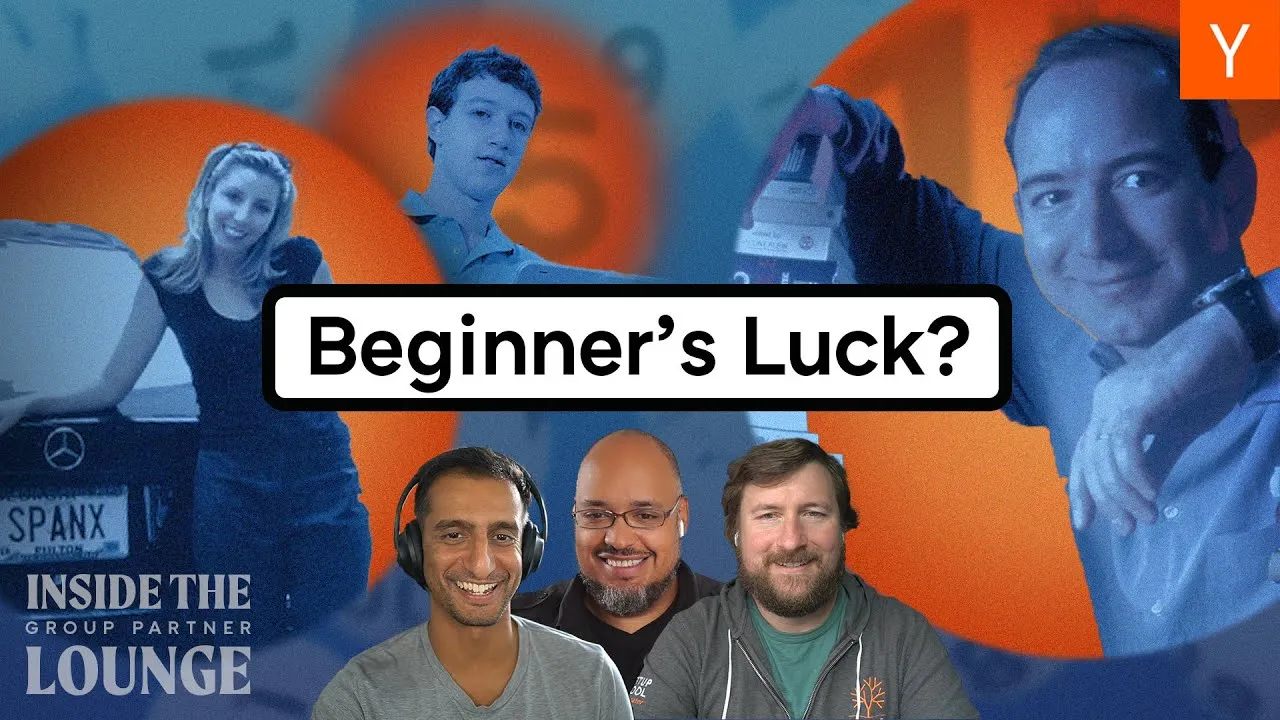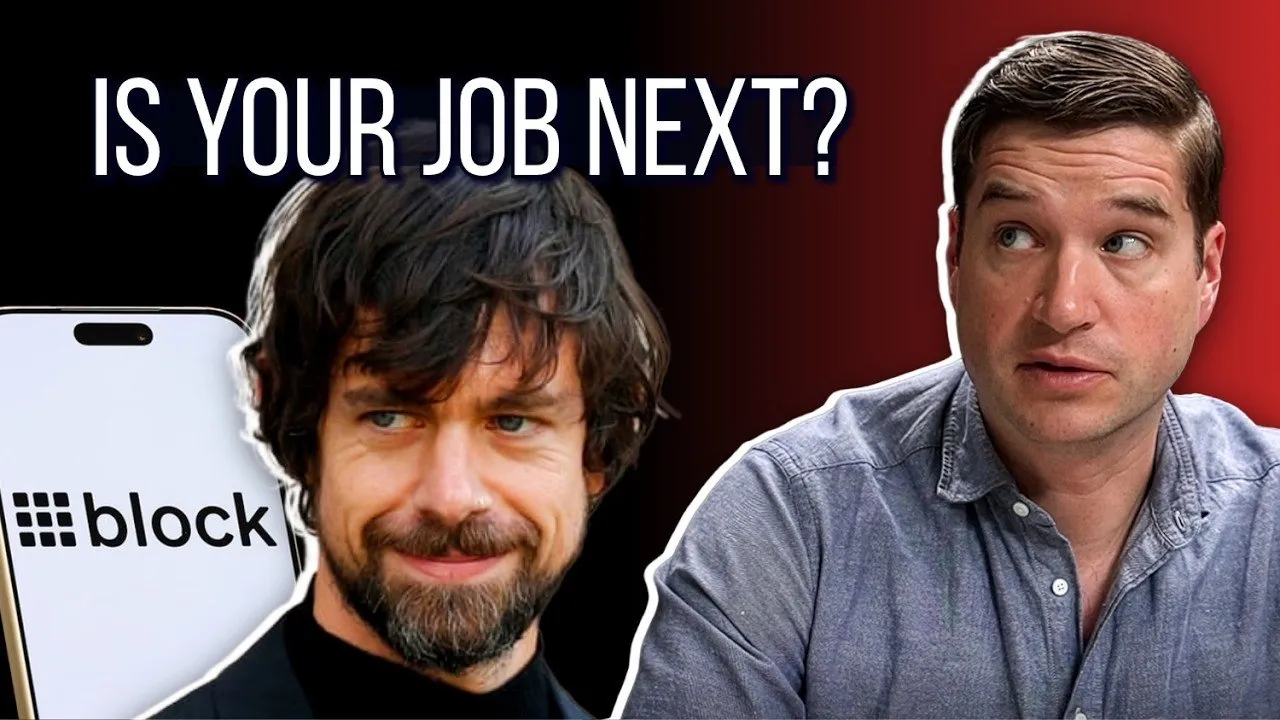Table of Contents
First-time founders leverage constraints, honest feedback, and genuine novelty to build innovative companies while second-time founders get trapped by expert opinions and dinner party impressions.
Timeline Overview
- 00:00–01:35 — Introduction and Setup: Y Combinator group partners introduce the counterintuitive advantages first-time founders have over experienced serial entrepreneurs who dominate startup media coverage
- 01:35–04:07 — Expert Opinions Are Not What You Want: How second-time founders get slowed down by too much advice from startup friends instead of talking to actual customers and users
- 04:07–05:37 — Picking Your Market: First-time founders take bigger risks on interesting ideas because they have nobody to impress at dinner parties, unlike second-time founders optimizing for impressive-sounding markets
- 05:37–06:58 — Novel Experiences Drive Energy: Everything feels exciting and new for first-time founders, while second-time founders know the lows will be just as low but the highs won't feel as high
- 06:58–08:08 — Innovation Through Constraints: First-time founders must innovate more because they face harder times raising money and hiring, forcing them to build genuinely great products
- 08:08–09:57 — Honest Feedback Advantage: First-time founders receive direct, unfiltered feedback because they have no existing relationships to protect, while investors sugarcoat criticism for serial entrepreneurs
- 09:57–12:07 — Autopilot Problem: Second-time founders cruise on reputation initially but crash when autopilot shuts off and they need real execution, unlike first-time founders who build strong fundamentals from day one
- 12:07–17:33 — Devil's Advocate: Acknowledging advantages of serial entrepreneurs including financial independence for bigger thinking and success with capital-intensive businesses like rockets, cars, and lending
- 17:33–20:07 — Domain Expertise Exception: Cases where second-time founders excel by building in spaces they know deeply, like Parker Conrad with HR software, though many founders wrongly hate their previous markets
Key Takeaways
- Second-time founders get paralyzed by too much expert advice while first-time founders focus on customer feedback
- First-time founders take bigger risks on interesting ideas because they have nobody to impress at social events
- Novelty and excitement of first experiences provide powerful motivation that serial entrepreneurs lose over time
- Resource constraints force first-time founders to innovate and build genuinely great products from the start
- First-time founders receive honest, direct feedback while investors protect relationships with serial entrepreneurs through sugarcoated responses
- Serial entrepreneurs often coast on reputation initially but struggle when real execution becomes necessary for later funding rounds
- Financial independence allows second-time founders to think bigger and avoid short-term desperation decisions
- Capital-intensive businesses like rockets, cars, and lending favor serial entrepreneurs who can raise massive funding rounds
- Domain expertise advantages only apply when founders want to return to markets they previously worked in
The Expert Opinion Trap That Slows Serial Entrepreneurs
Second-time founders accumulate extensive networks of smart startup people, mentors, and advisors who eagerly share opinions about new venture ideas. While this seems advantageous, the abundance of expert feedback creates analysis paralysis that significantly slows decision-making and idea validation. Serial entrepreneurs spend months digesting thoughtful opinions from various sources instead of engaging directly with potential customers who actually experience the problems they're trying to solve.
The fundamental issue lies in confusing expertise about startups with expertise about specific customer problems. Startup-savvy friends can discuss market dynamics, competitive landscapes, and business model considerations, but they cannot validate whether real users want particular solutions. Many brilliant startup advisors lack direct experience with the problems entrepreneurs are addressing, yet they offer confident opinions that sound authoritative and can mislead founders away from customer-focused validation.
First-time founders bypass this trap entirely because they lack extensive startup networks. Without access to numerous expert opinions, they're forced to engage directly with potential customers and users to understand problem severity and solution preferences. This direct customer engagement provides superior insights compared to secondhand analysis from startup experts who may never have experienced the problems themselves.
The Camp YC example illustrates this perfectly—pitching an idea to ten startup people who unanimously declared it terrible, leading to abandonment without any customer validation. Had the founder engaged potential users instead of seeking expert startup opinions, they might have discovered valuable problem variations or solution approaches that startup experts couldn't envision. Customer conversations generate specific, actionable feedback while expert opinions often remain abstract and theoretical.
Market Selection Without Social Pressure
First-time founders enjoy significant advantages in market selection because they haven't developed social pressures around appearing impressive at dinner parties and networking events. Serial entrepreneurs often optimize for ideas that sound sophisticated and ambitious when described to other successful people, leading them away from genuinely valuable opportunities that might seem mundane or unglamorous to outsiders.
The dinner party problem causes second-time founders to gravitate toward impressive-sounding markets like "revolutionizing energy" while avoiding ideas that seem embarrassing to explain, such as "air bed and breakfast" in its early days. This social pressure filter eliminates many of the best startup opportunities because breakthrough companies often begin by serving niche markets or solving problems that seem trivial to people who don't experience them directly.
Coinbase provides another perfect example of this dynamic. In 2011-2012, pitching a cryptocurrency exchange would have seemed ridiculous to most sophisticated startup audiences. Second-time founders would have struggled to present this idea confidently at social events, while first-time founders could pursue it based purely on their interest in the problem and technology without worrying about social validation.
First-time founders take bigger risks on ideas they find personally interesting because they have nobody to impress and less awareness of what's considered "good" versus "bad" in startup circles. This naivety becomes a superpower that allows them to pursue opportunities that experienced entrepreneurs dismiss as insufficiently impressive or venture-scalable, often leading to breakthrough companies that retrospectively seem obvious.
The Energy Advantage of Experiencing Everything First
Novelty provides powerful psychological motivation that second-time founders lose through repeated exposure to startup milestones. First-time founders experience genuine excitement and celebration around achievements like their first paying customer, first employee hire, or first significant revenue milestone. These emotional highs create sustained motivation during the inevitable low periods that all startups experience.
Second-time founders know intellectually that early wins represent tiny steps toward much larger goals. Their first paying customer feels like "just one of thousands we need" rather than a cause for celebration. First hires seem like "one of hundreds we'll need" instead of major achievements worth recognizing. This perspective eliminates much of the emotional reward that sustains entrepreneurs through difficult periods.
The problem compounds because startup lows remain equally devastating regardless of experience level. Second-time founders still feel crushed by major setbacks, customer rejections, or funding difficulties, but they've lost access to the emotional highs that traditionally balance these negative experiences. The asymmetric impact—equally low lows but diminished highs—creates a motivation deficit that makes perseverance more difficult.
First-time founders also bring fresh energy and perspective to problem-solving because they haven't developed fixed assumptions about what works or doesn't work in their market. They approach challenges with beginner's mind, often discovering creative solutions that experienced entrepreneurs dismiss based on previous experiences that may not apply to current circumstances or different customer segments.
Innovation Through Resource Constraints
First-time founders face significant disadvantages in fundraising and hiring that paradoxically force them to build better products and develop superior execution capabilities. Without easy access to capital or established networks for recruiting talent, they must create genuinely compelling solutions that attract customers and team members through merit rather than reputation or resources.
Resource constraints breed creativity by eliminating options that allow entrepreneurs to avoid fundamental product-market fit challenges. First-time founders cannot hire large teams to compensate for product weaknesses or raise substantial funding to buy market share through aggressive marketing spend. They must solve real customer problems effectively enough that people willingly pay for imperfect solutions and join early-stage teams.
Second-time founders often have easier access to funding based on their track records, allowing them to raise money before proving strong product-market fit. This apparent advantage becomes a trap because it enables them to avoid the difficult but essential work of understanding customer needs deeply and building solutions that generate genuine enthusiasm. Easy money can subsidize mediocre products longer than market forces would naturally allow.
The hiring dynamic works similarly. Serial entrepreneurs can attract talent through their reputations and ability to offer competitive compensation packages, while first-time founders must convince people to join based on mission, opportunity, and personal conviction. This constraint forces first-time founders to develop compelling visions and build teams of genuinely committed people rather than mercenaries attracted primarily by compensation packages.
The Honest Feedback Advantage
First-time founders receive significantly more honest and direct feedback from investors, advisors, and potential partners because they haven't developed relationships that require diplomatic handling. When investors evaluate unknown entrepreneurs, they can provide straightforward assessments without worrying about damaging ongoing relationships or future deal flow opportunities.
Serial entrepreneurs face the opposite dynamic. Investors and advisors hesitate to provide harsh feedback because these founders represent valuable network nodes who can provide referrals to other deals, introductions to other entrepreneurs, or opportunities for future collaboration. The social and professional costs of honest criticism outweigh the benefits, leading to sugarcoated feedback that doesn't help entrepreneurs understand real weaknesses in their ideas or execution.
This relationship management extends beyond investors to include potential customers, partners, and advisors who may prioritize maintaining positive relationships with successful entrepreneurs over providing useful feedback. Second-time founders often receive false positive signals that their ideas have market potential when people are actually just being polite or trying to preserve valuable relationships.
The political dynamics within investment firms also favor serial entrepreneurs in ways that obscure real feedback. Investing in known entrepreneurs helps individual investors build reputations within their firms and get deals approved more easily, creating incentives to fund based on founder credentials rather than business fundamentals. First-time founders get evaluated purely on their ideas and execution capabilities because they offer no political advantages to investors.
The Autopilot Problem and Execution Reality
Second-time founders often coast on their reputations during early stages, making fundraising and initial team building easier without proving strong business fundamentals. This creates an "autopilot" effect where they assume their experience and credentials will continue opening doors indefinitely, leading to complacency around core execution challenges like product development and customer acquisition.
The autopilot eventually shuts off when businesses need to demonstrate real traction, revenue growth, and customer satisfaction to secure later-stage funding or achieve sustainable growth. At this point, second-time founders who relied on reputation rather than building strong operational capabilities find themselves unprepared for execution challenges that first-time founders learned to handle from day one.
The analogy of driving 120 miles per hour down a curvy mountain road when autopilot disengages captures this dynamic perfectly. Serial entrepreneurs have momentum and high expectations but may lack the hands-on execution skills needed when circumstances become challenging. They assumed their experience would translate automatically to better performance, but startup execution requires specific capabilities that must be developed through direct practice.
First-time founders start on suburban roads going slowly, learning fundamental execution skills gradually and building operational capabilities that serve them throughout the startup journey. They never had the luxury of coasting on reputation, so they develop real competencies around customer development, product iteration, and team building that become increasingly valuable as companies scale.
When Serial Entrepreneurs Have Real Advantages
Financial independence represents the most significant advantage for successful serial entrepreneurs. Founders who achieved substantial exits from previous companies can think bigger and make long-term decisions without the desperation and short-term thinking that often plague first-time founders facing financial pressure to generate revenue quickly.
First-time founders frequently make suboptimal strategic decisions driven by immediate financial needs rather than long-term business potential. They might choose product-led growth strategies that generate quick revenue instead of enterprise sales approaches that would build stronger long-term businesses but require longer sales cycles and higher upfront investment in sales capabilities.
Capital-intensive businesses represent another clear advantage for serial entrepreneurs who can more easily raise substantial funding rounds. Companies like SpaceX, Tesla, Opendoor, and Boom Supersonic require hundreds of millions or billions of dollars in funding before generating meaningful revenue. Serial entrepreneurs with proven track records find it much easier to convince investors to back these ambitious, long-term bets.
The examples are compelling: Elon Musk leveraging his PayPal success to fund SpaceX and Tesla, Eric Wu using his Movoto exit to build Opendoor, and Blake Scholl transitioning from software to supersonic aviation with Boom. These businesses require patient capital and long development timelines that favor entrepreneurs with established credibility and fundraising capabilities.
Domain expertise provides the final major advantage for serial entrepreneurs who choose to build second companies in markets they understand deeply. Parker Conrad's progression from Zenefits to Rippling demonstrates how deep knowledge of HR software markets, customer needs, and operational challenges can accelerate second company development and help entrepreneurs avoid previous mistakes.
The Domain Expertise Exception and Its Complications
Building in familiar markets offers substantial advantages when serial entrepreneurs possess genuine expertise and maintain enthusiasm for solving problems in those spaces. The Workday example—where founders leveraged PeopleSoft experience to build cloud-based HR solutions—shows how domain knowledge can accelerate product development and customer acquisition in rapidly evolving markets.
However, many serial entrepreneurs develop negative associations with their previous markets, declaring them terrible or advising others to avoid similar opportunities. This bitterness often stems from failure experiences that create psychological barriers to objective market assessment. Founders who didn't succeed may unconsciously want others to fail as well to protect their self-image and rationalize their own outcomes.
First-time founders must be cautious when seeking advice from serial entrepreneurs who previously attempted similar ideas. While these experienced founders may offer valuable tactical insights about what didn't work, their strategic assessments of market potential or opportunity viability may be colored by personal disappointment and ego protection rather than objective analysis.
The key lies in extracting factual information about what previous entrepreneurs tried and what specific outcomes they achieved, while ignoring their interpretations or opinions about market attractiveness or competitive dynamics. Facts about customer behavior, product development challenges, and go-to-market approaches provide useful intelligence, but strategic conclusions often reflect personal biases rather than market realities.
Conclusion
The advantages of first-time founders stem from their constraints, naivety, and freedom from social pressures that often trap serial entrepreneurs in suboptimal patterns. While experienced founders possess valuable knowledge and easier access to resources, these benefits frequently become liabilities that prevent them from engaging deeply with customers, taking risks on interesting ideas, and building the fundamental execution capabilities that create lasting companies. The most successful businesses—Google, Facebook, Microsoft, Amazon—demonstrate that first-time founders can compete effectively against any level of experience when they focus on solving real customer problems with genuine dedication and creativity.
Practical Implications
- Focus on customer conversations rather than seeking opinions from startup experts who may lack domain knowledge
- Embrace ideas that seem boring or unglamorous to sophisticated audiences but solve real problems you understand personally
- Celebrate early wins and milestones to maintain motivation during inevitable low periods that affect all entrepreneurs
- Leverage resource constraints as creative forcing functions that lead to better product-market fit and execution capabilities
- Seek direct, honest feedback by talking to people who have no existing relationships to protect with you
- Build fundamental execution skills from day one rather than assuming experience or credentials will substitute for operational excellence
- Ignore market size concerns and venture scalability until you've proven genuine customer demand and built sustainable revenue
- Extract facts from experienced founders' advice while discounting their strategic opinions about market attractiveness
- Remember that some of history's most successful companies started with first-time founders who outcompeted experienced entrepreneurs
- Use your outsider perspective as an advantage to see opportunities that industry experts dismiss or overlook





